Mobile App Development
Insights into Quantum App Development: Key Opportunities and Challenges

Quantum computing, once an abstract concept, is swiftly morphing into a key driver of innovation, promising an economic boost of up to $850 billion over the next two decades. And it’s no wonder, considering that Google's quantum marvels are now cracking complex problems that traditional tech would grind over for a decade – in just 3 seconds.
So where does this fit into our daily lives? This leap sets the stage for quantum app development that can create applications that solve problems beyond the capabilities of classical computers. This offers the opportunity to perform complex calculations at unprecedented speeds, opening doors to advancements in fields like cryptography, materials science, and drug discovery.
As exciting as this may seem, it's important to remember that quantum coding is a relatively new field. One of the main challenges here is that the logic of traditional programming doesn't apply to this. But as we stand at the edge of this quantum wave, the real question we aim to address is: Are we prepared to ride this wave, master the quantum language, and unlock its full potential? Let’s try to figure this out.
Short history of quantum computing
Quantum computing isn't exactly a buzzword out of the blue. Its roots run deep into the 20th century, intertwined with the fundamentals of quantum mechanics which gave rise to it in the first place. Folks like Max Planck, Albert Einstein, and Niels Bohr have been grappling with the nature of quantum reality for quite a while. Fast-forwarding to the late 1900s, physicist Richard Feynman toyed with this theory and proposed, "Hey, why not use quantum mechanics to actually compute stuff?" And that was a fresh angle.

It's not just the 'whats' and 'hows' of quantum computing that are remarkable, but the 'when' as well. Quantum computing didn't just appear overnight in a 21st-century lab. It's been brewing for decades, built on top of a legacy of groundbreaking science.
By the 1990s, it had transitioned from theoretical musings to tentative physical experimentation. The quest to build a quantum computer became tangible when Peter Shor in 1994 developed his algorithm that could use a quantum computer to factor large numbers exponentially faster than the best-known algorithms running on a classical computer. This not only demonstrated a potential application for quantum computers but also shook the world of encryption, which often relies on the difficulty of factoring large numbers.
Then came the practical tests. In 1998, the first qubit was physically demonstrated, and we witnessed the birth of computation with actual quantum bits. The early 2000s saw the realization of small-scale quantum algorithms, with IBM and Google becoming notable players, investing heavily in the technology. Google, in particular, claimed "quantum supremacy" in 2019 when their 54-qubit processor completed a calculation in mere seconds that would've taken supercomputers thousands of years.
The journey from foundational principles to practical quantum computing has opened a new frontier: quantum app development. With quantum hardware becoming more accessible, and the advent of cloud-based quantum computing, the concept of quantum app development emerged. This development aimed to harness the unique capabilities of quantum computing to create applications for solving complex real-world problems, ranging from data encryption to simulating molecular interactions for drug discovery and beyond.
What is quantum app development?
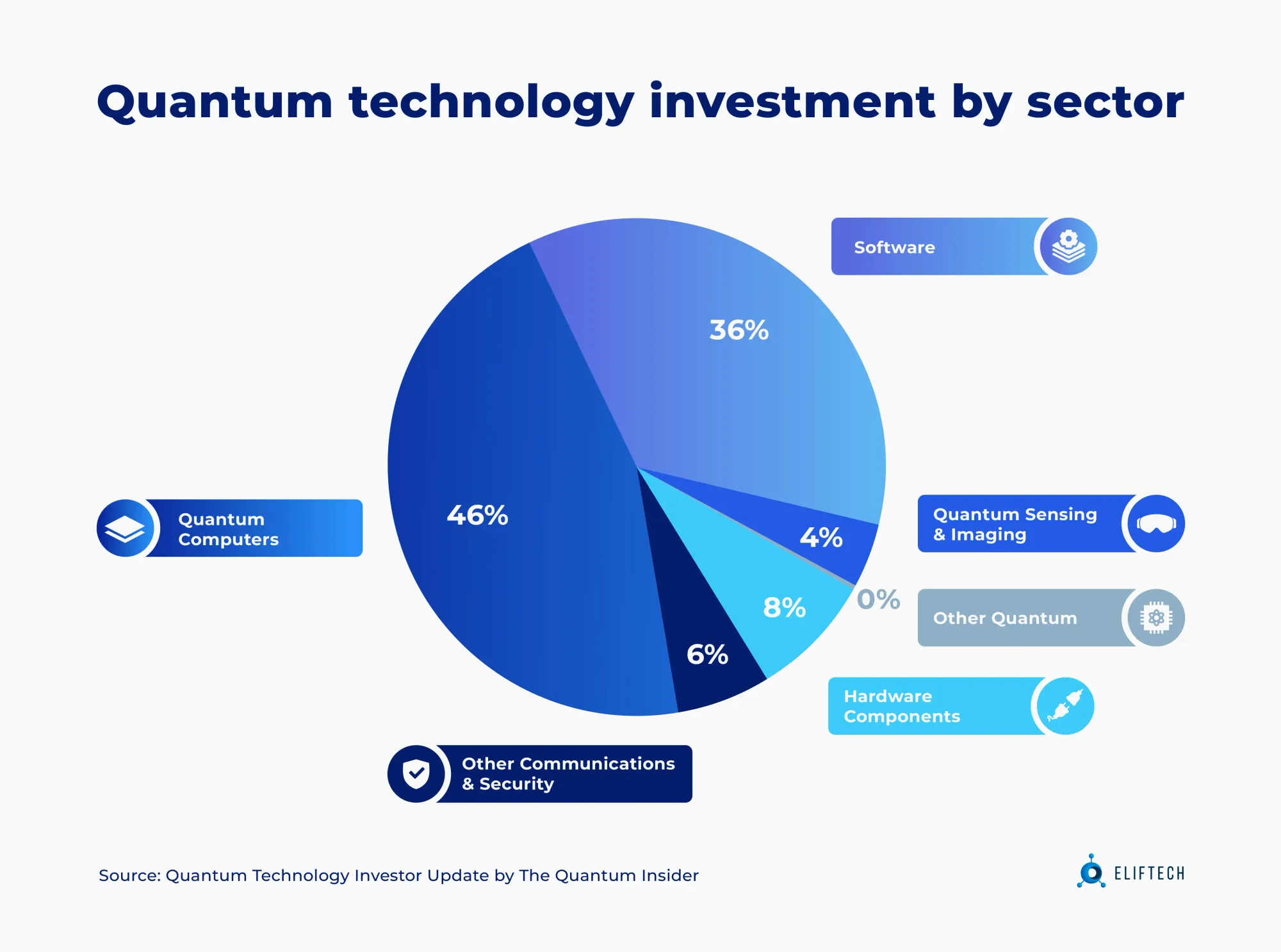
Quantum app development takes advantage of quantum mechanics' unique aspects, notably through qubits' potential for simultaneous multiple states (superposition) and distant interconnections (entanglement). This breakthrough diverges sharply from classical computing, enabling quantum applications to swiftly navigate through complex data and resolve difficult challenges more efficiently than traditional software.
This capability positions quantum computing as a highly sought-after technology across various business sectors. Particularly, its potential for rapid, complex problem-solving has piqued the interest of industries looking to integrate this technology into their operational frameworks. Experts anticipate that quantum computing will notably influence future developments in AI, banking, and cybersecurity, given its ability to execute calculations at unprecedented speeds.
On a practical level, quantum applications outshine their classical counterparts by processing multiple outcomes simultaneously. Take cryptography as an example: while a classical computer would examine each potential key in turn, a quantum application could evaluate all possibilities at once, significantly expediting the decryption process.
Factors behind the democratization of quantum app development
The boom in quantum app development isn't random; it's a calculated outcome of several intertwined factors that, together, are accelerating this field beyond the realm of speculation, straight into reality.
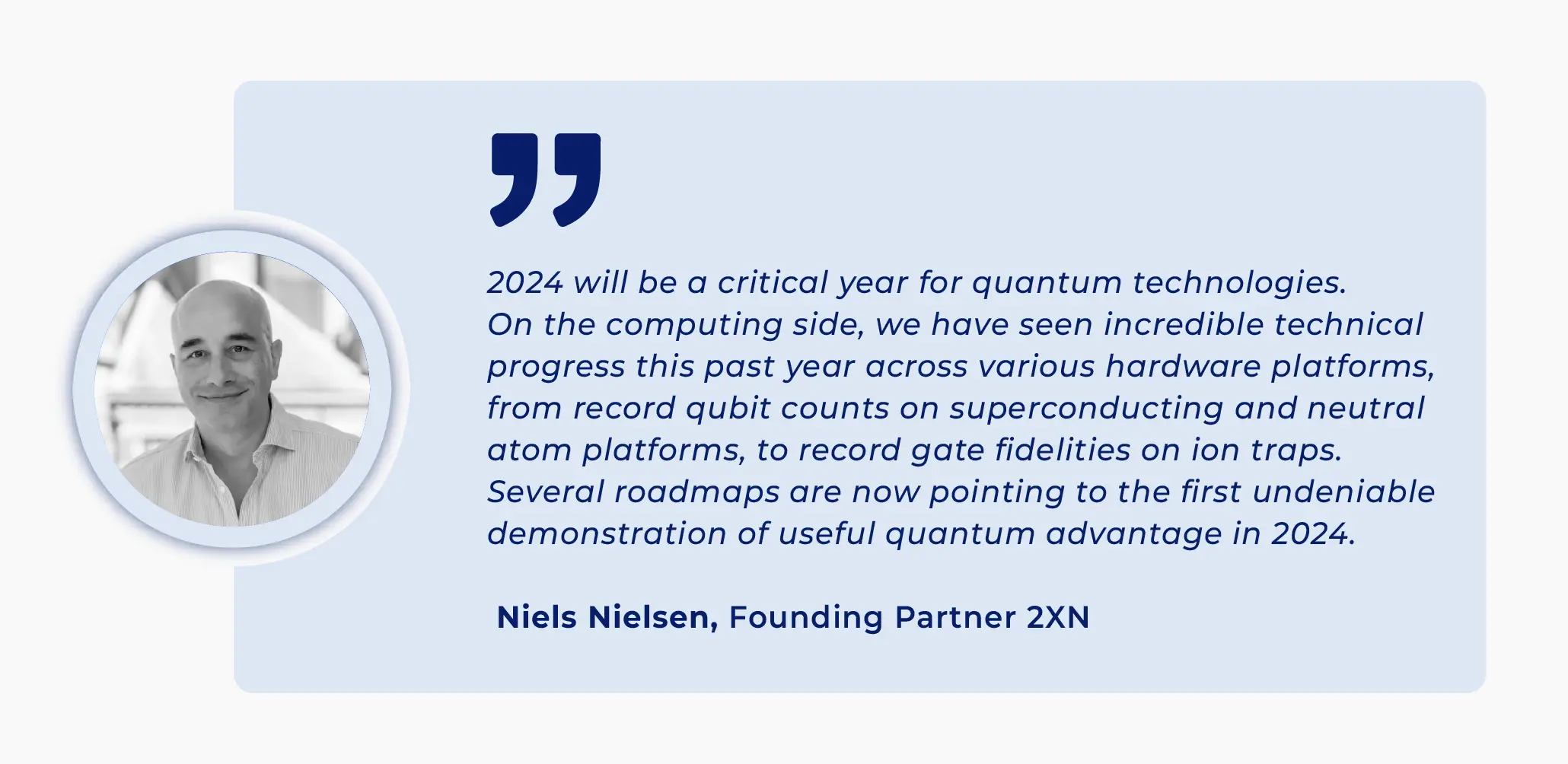
- Cloud technology: Cloud technology effectively democratizes access to quantum computing resources. Hosting quantum computing processes on the cloud removes the barrier of needing expensive, specialized hardware, making quantum computing accessible to developers anywhere. This accessibility revolutionizes the quantum application development process, enabling a broader base of talent to contribute to its evolution.
- Investment: Investment acts as the critical lifeline for sustained research and development in the quantum field. Beyond mere capital, investment signifies trust and expectation in quantum computing's potential, drawing more talent and resources into the field. It catalyzes innovation, facilitating the exploration of new quantum computing paradigms and the expansion of the technological frontier.
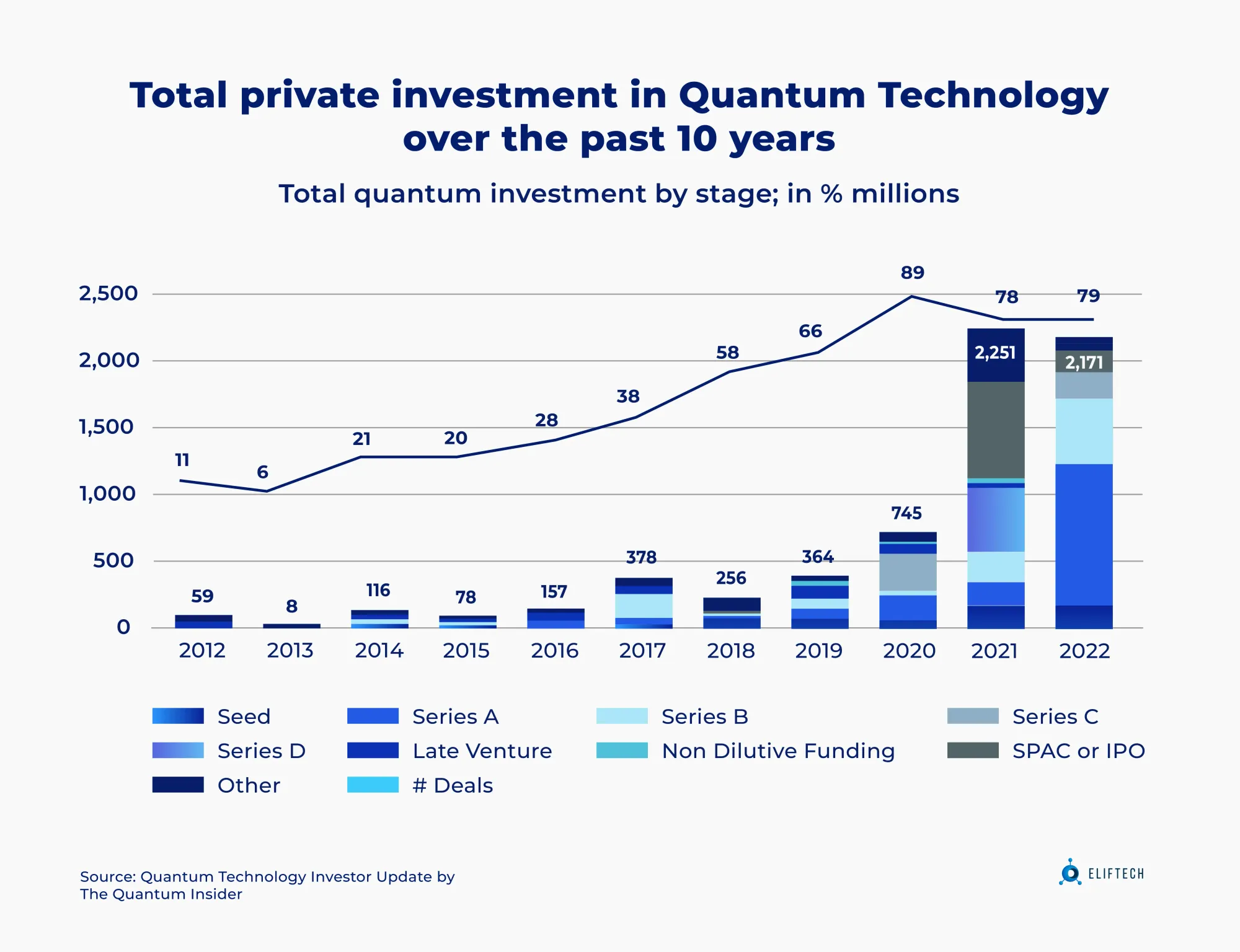
- Education: The growing interest and investment in quantum education are pivotal in developing a skilled workforce ready to tackle quantum computing challenges. By integrating quantum computing concepts into educational curricula, we are preparing a new generation of developers who view quantum computing not as an oddity but as a practical instrument in their problem-solving arsenal.
- Collaboration: Collaboration across academia, industry, and governmental bodies breaks down traditional barriers, fostering a rich environment for innovation. This synergy not only accelerates the pace of quantum research but also ensures that advancements are shared, evaluated, and implemented across different sectors, amplifying the impact of individual breakthroughs.
- Technological evolution: Continuous improvements in quantum computing technology – from reducing error rates to enhancing quantum algorithms – drive the field closer to practical, everyday applications. This progression transforms quantum computing from a speculative venture into a realistic, powerful tool for solving complex problems.
Quantum computing market & key market players
Delving into the quantum computing market, we're looking at a sector poised for explosive growth – from a modest $89 million in 2016 to a projected $949 million by 2025, with a robust CAGR of 30% from 2017.
Amidst these developments, one player stands prominent; the United States, holding a majority stake in the quantum computing market with a sizable 50% share. What’s interesting, the quantum sector is now attracting larger companies compared to its early days of mainly small, start-up teams. Currently, 56% of companies report having over 30 employees, suggesting a shift towards commercialization backed by prior funding and increasing demand. Quantum computing is transitioning from a specialty of startups to a key player in the tech industry.
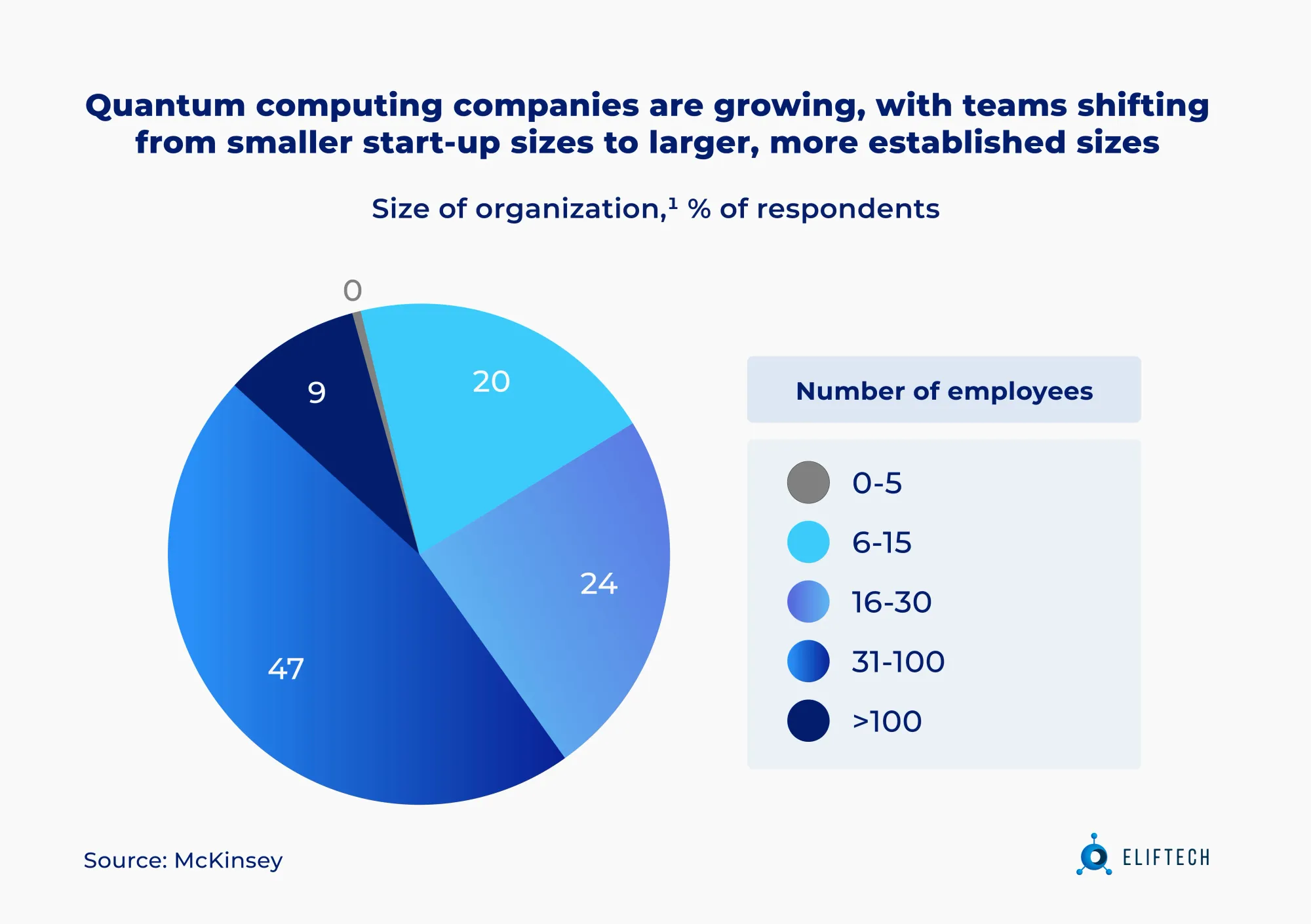
In application terms, finance leads the charge with 28% of use cases, followed by energy and materials at 16%, and technology sectors. These industries are gearing up for a revolution in efficiency and capability, fueled by quantum computing's exponential progress.
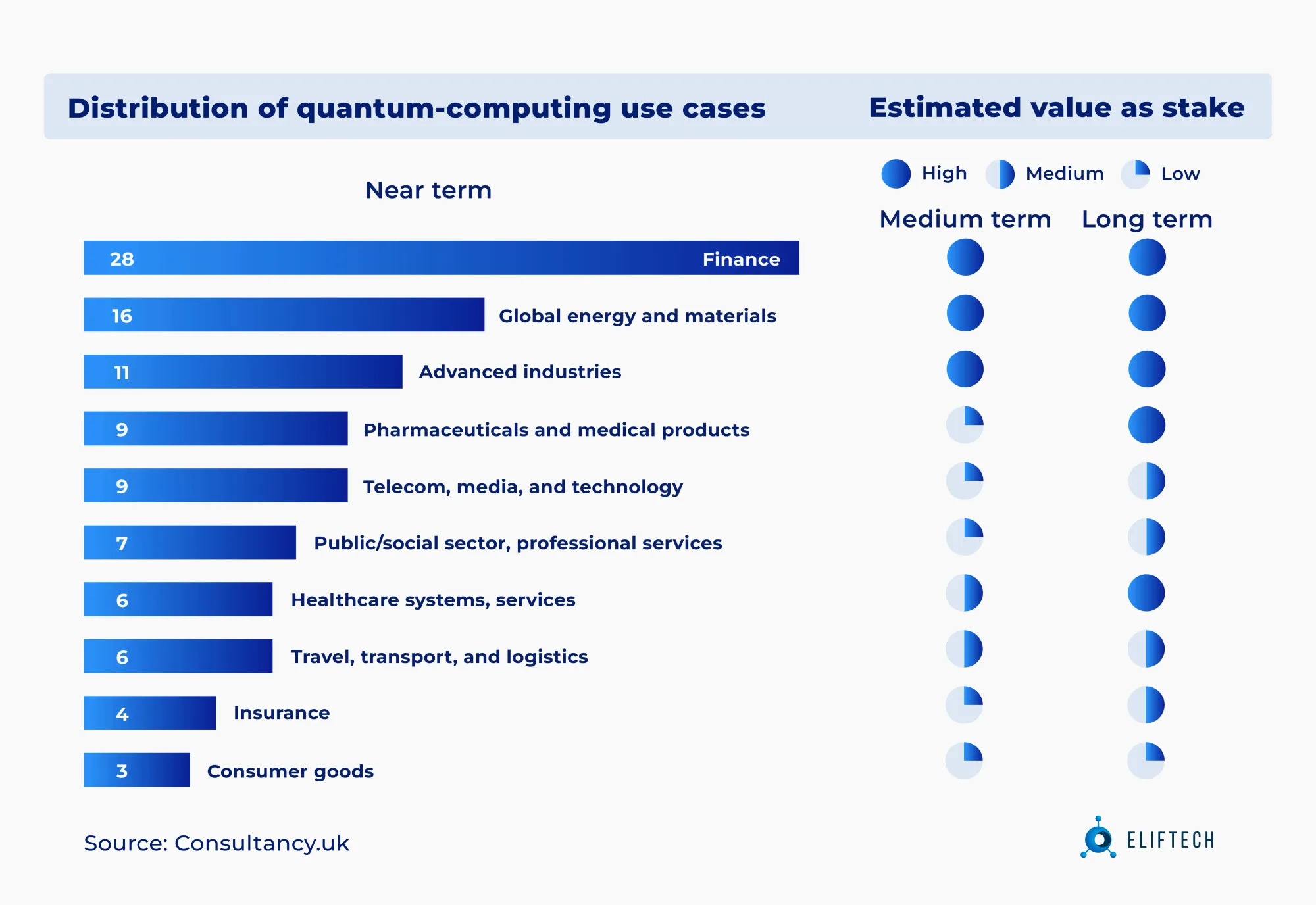
Key market players
Microsoft, IBM, and Google are leaders in the quantum computing industry due to their significant investments, robust research programs, and pioneering developments. However, these giants are not alone in their quest to unlock quantum computing's full potential, here is the list of the top 10 quantum app development companies:
- IBM: A powerhouse in the tech industry, IBM is actively utilizing quantum computing to pioneer the development of quantum computers for a breadth of industries.
- D-Wave Systems: Known for its well-crafted quantum computers, D-Wave remains a crucial player in the industry, engaging in a continuous quest for enhancements and breakthroughs.
- Rigetti Computing: Rigetti stands out with its full-stack quantum computing approach, offering hardware, software, and optimized applications.
- Google: Besides internet technology, Google explores the synergy between artificial intelligence and quantum computing to push the boundaries of AI performance and capabilities.
- Honeywell Quantum Solutions: A unit of the American multinational, Honeywell harnesses the power of quantum computing for varied commercial applications.
- Microsoft: With roots in traditional computing, Microsoft now invests in quantum technologies, boosting the resources and capabilities available to quantum programmers.
- IonQ: Committed to creating the world's best quantum computers, IonQ confronts the most complex of challenges with its unique trapped ion technology.
- Alibaba Cloud: Backed by one of Asia's largest tech firms, Alibaba Cloud houses a dedicated laboratory investing in research for quantum computing advancements.
- Intel: Intel remains a substantial part of the quantum conversation with its continuous research and development in quantum hardware and systems.
- Atos: A global leader in digital transformation, contributes to the quantum space through its quantum learning machine, paving the way for future advancements.
Why is quantum computing the “next big thing” in app development?
Quantum computing turns traditional data processing on its head, leveraging quantum mechanics to blast through monumental datasets at incredible speeds – far outpacing classical computers. In app development, this means cracking complex challenges in a fraction of the time. From forecasting market movements with unprecedented precision to uncovering deep patterns in vast amounts of data, quantum apps equip decision-makers in finance – and beyond – with powerful tools to navigate uncertainty.
When we’re dealing with supercomputers, we're hitting a ceiling, but quantum computing blows the roof wide open.
Accelerated processing capabilities
Quantum computing introduces a seismic shift in data processing speeds. By leveraging qubits, which can represent multiple states simultaneously, quantum computers can solve complex computational problems at a fraction of the time taken by classical computers. This speed is not incremental; it's exponential.
Apps requiring real-time data analysis, such as financial trading platforms, can benefit immensely. Quantum computing could enable these apps to analyze market trends and execute trades at speeds that are orders of magnitude faster than current capabilities.
Enhanced machine learning
Quantum algorithms are a game-changer for machine learning. They can rapidly process and analyze large datasets, which can dramatically shorten the time required for training machine learning models. For apps that rely on AI, this means smarter algorithms that evolve quickly and provide more accurate predictions and responses, enhancing the user experience significantly. Personalized content delivery apps, like streaming services, could use quantum-enhanced machine learning to analyze viewing habits and preferences far more efficiently. This leads to highly tailored content recommendations, improving user satisfaction and engagement.
Superior data security
Quantum computing offers unparalleled advancements in cryptography. Quantum-key distribution (QKD) promises near-unbreakable encryption because it relies on the principles of quantum mechanics. Any app developed with quantum security in mind could potentially offer users a level of data security that is currently unrivaled, making it a formidable tool against cyber threats. For example, messaging apps with end-to-end encryption could become virtually impervious to hacking attempts. Quantum cryptography could ensure that user communications are secure, fostering trust and reliance on the app’s privacy measures.
Improved optimization
Many apps require optimization algorithms to operate efficiently, such as those used in route planning or resource allocation functionalities. Quantum computing is poised to solve optimization problems with a level of precision and speed unattainable by classical computers, directly benefiting apps that are geared toward logistics, scheduling, and operational efficiency. A good example would be navigation and logistics apps that could see dramatic improvements. Quantum computing could optimize route planning in real-time, considering a multitude of variables and constraints, thus saving time and fuel costs for users and businesses alike.
Energy efficiency
Despite their incredible computation power, quantum computers could ultimately be more energy-efficient than their classical counterparts. They compute more efficiently and can therefore perform the same tasks using less energy. For app developers, this means the potential to contribute to sustainability while deploying highly efficient applications.
Cross-industry innovation
The versatility of quantum computing means that it can influence a wide array of fields, from finance to healthcare. For app developers, this opens up opportunities to create transformative applications across industries, driving innovation and offering competitive advantages in markets that were previously inaccessible due to computational limitations. For instance, in healthcare, apps designed for drug discovery or personalized medicine could leverage quantum computing to analyze vast datasets of genetic information. This, in turn, could expedite the development of bespoke treatment plans for patients, potentially saving lives.
Future-proof development
As technology progresses towards quantum supremacy, being early adopters could be beneficial for app developers. By integrating quantum computing principles now, developers are effectively future-proofing their applications, ensuring that they remain relevant and cutting-edge as the quantum landscape evolves.
Quantum app development tools
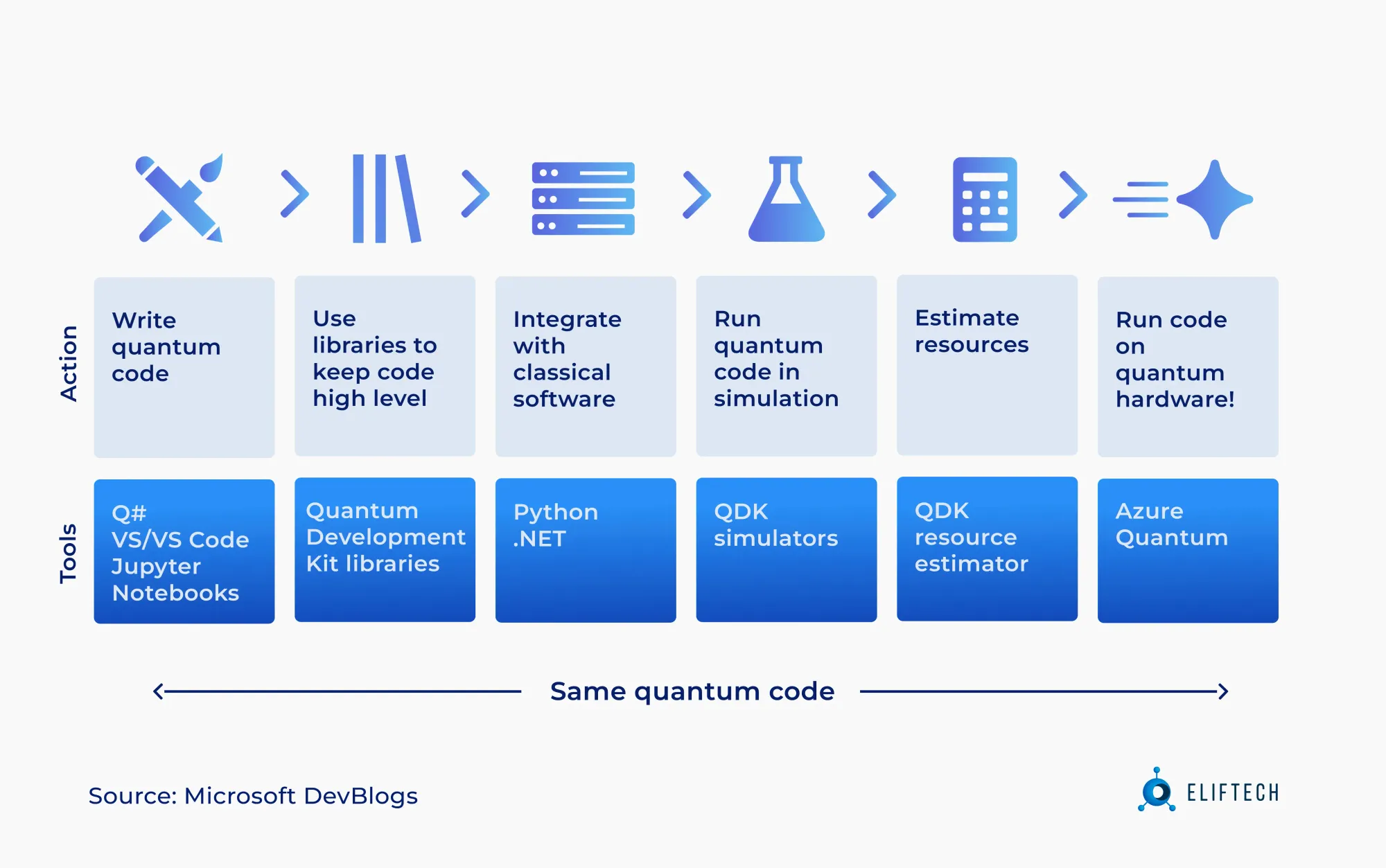
Building quantum app development solutions calls for quantum app development tools, a specialized set of software and hardware designed to bridge the gap between traditional software development and quantum computing's unique ecosystem. These tools not only offer resources for designing, testing, and deploying apps on real quantum hardware or simulators but also come equipped with essential quantum algorithms and library support.
These quantum algorithms, from Shor's for factorization to Grover's for database searching, leverage quantum principles like entanglement and superposition, aiming to perform more efficiently than their classical counterparts. Coupled with robust libraries like IBM's Qiskit or Google's Cirq, developers have a pantry stocked with quantum ingredients, enabling them to cook up their quantum applications faster and more efficiently.
The toolkit encompasses various hardware and infrastructural tools:
Hardware:
- Quantum processors: Accessible via cloud platforms (IBM Quantum Experience, Google Quantum AI) or owned hardware.
- Quantum simulators: For emulating quantum computations on classical computers.
- High-performance computers: Needed for running complex simulations.
- Cryogenic systems: For some quantum processors, maintaining necessary low temperatures.
- Photon detectors & lasers: In case of photonic quantum computing.
Infrastructure & other tools:
- Integrated quantum software development environments (IDEs): For seamlessly writing and debugging quantum code.
- Quantum circuit diagramming tools: For visualizing quantum algorithms.
- Version control systems: To manage the changes in quantum algorithms and scripts effectively.
- Collaboration platforms: For team-based quantum software development.
Knowledge requirements:
- Fundamental understanding of quantum mechanics: Essential for grasping how quantum algorithms work.
- Algorithm design and development knowledge: To craft effective quantum algorithms.
- Familiarity with linear algebra and complex numbers: Since they form the mathematical foundation of quantum computing.
These development tools allow devs to leverage quantum principles like entanglement and superposition and create algorithms that leave their classical counterparts in the dust. Whether it’s cracking complex optimization issues in logistics or finance, forging quantum-resistant encryption protocols, or pushing the boundaries of machine learning models, quantum app development tools are fostering the shift towards a quantum-strong future. It might seem daunting initially, but remember that every quantum leap starts with learning to navigate these tools.
Quantum app development applications
Navigating through the quantum computing landscape, we uncover an array of possibilities for industry transformations. Insights from McKinsey and Consultancy.co paint an interesting landscape. Finance (28% applicability) leads the quantum revolution, followed by Energy and Materials (16%), while the automotive industry is gearing up for impactful transformation by 2025. Quantum's predicted economic jolt of $2-$3 billion to automotive by 2030 illustrates the broad-reaching potential of this frontier.
Such striking predictions illustrate the expansive reach of this emerging technology. The question now is – what will be its practical implementation across these and other sectors?
Finance
In the finance world, risk calculations and fraud detection that traditionally take days could potentially shrink to minutes, even seconds. Imagine quantum algorithms crunching through complex market data to identify patterns no classical computer could discern swiftly. That's not just efficiency; it's a game-changer for high-frequency trading and strategic investments.
Energy
Energy and materials could see an era of unmatched innovation, especially in battery technology and sustainable materials. Quantum simulations have the power to model molecular interactions in ways currently beyond our reach, paving the path for advanced materials that could transform everything from electric vehicles to renewable energy storage.
Automotive
Then there's the automotive sector, where the impact of quantum computing could be both broad and profound. From optimizing supply chains via quantum algorithms to improving the aerodynamics of vehicles through complex simulations that only quantum computers can perform efficiently, the potential is vast. The development of quantum sensors might even accelerate the advent of fully autonomous vehicles by enhancing their navigation capabilities.
Healthcare
Perhaps one of the most profound impacts of quantum computing could be felt in healthcare. Quantum applications are poised to enable complex molecular modeling and genetic analysis at speeds unimaginable with current technology. This capacity could revolutionize drug discovery, personalize medicine by tailoring treatments to an individual's genetic makeup, and untangle the complexities of genetic diseases.
Beyond these domains, quantum computing also has promising applications in:
- Crop science: Enhancing agriculture through more efficient use of resources and better crop yield prediction models.
- Cybersecurity: Strengthening data protection by developing new encryption methods that conventional computers cannot break.
- Material science: Designing novel materials with unprecedented properties, which could benefit multiple industries including aerospace and construction.
- Space exploration: Solving complex optimization problems for space agencies, opening new possibilities for exploration and data collection.
Challenges of quantum app development
Venturing into quantum app development, while thrilling, comes bundled with its unique set of challenges – akin to navigating a new universe with a map that's still being drawn. The raw potential of quantum computing to reshape industries from finance to healthcare is palpable, yet the road is strewn with hurdles.
- Quantum complexity: Quantum algorithms, with their ability to compute vast data arrays simultaneously, demand an entirely different programming mindset from developers. Mastering new paradigms while staying adaptable to rapidly evolving quantum technologies brings unprecedented complexity.
- Lack of standardization: The quantum oscillates between competing technologies and systems, each with its own programming language and rules. This diversity, while driving innovation, complicates development efforts significantly. Developers are required to stay agile and ready to pivot in a constantly transforming landscape.
- Data fragility: The susceptibility of qubits to external interference leads to high data loss risk. Developers are locked in a battle against time to perform quantum operations before decoherence ensues, making quantum apps both an engineering and a racing challenge.
- Talent gap: Quantum computing requires a unique blend of computer science, physics, and math skills. The limited pool of such multidisciplinary professionals slows down the pace of quantum app development, making the quantum talent gap a critical hurdle.
Quantum app development: The time to act is now?
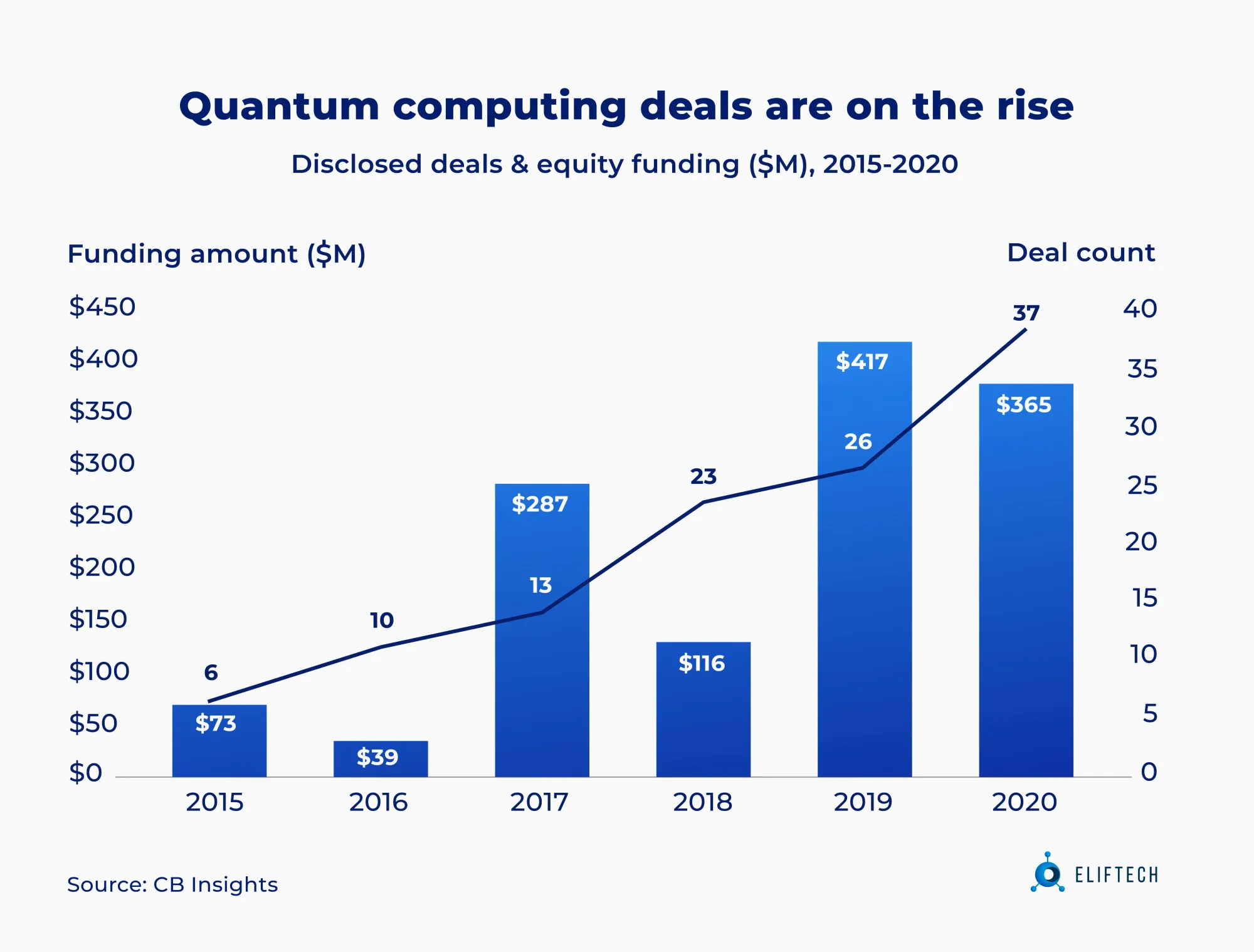
The field of quantum app development presents both challenges and immense potential. Despite complexities, the high growth trajectory of this sector indicates vast opportunities. Thus, if you’re looking towards app development with quantum computing, starting to make the first steps now may be crucial because the technology is rapidly advancing and beginning to move from research labs to real-world applications. This shift presents a unique opportunity to gain a competitive edge in an emerging field. Moreover, investments in quantum app development services are growing, indicating strong future support for those entering this space.
